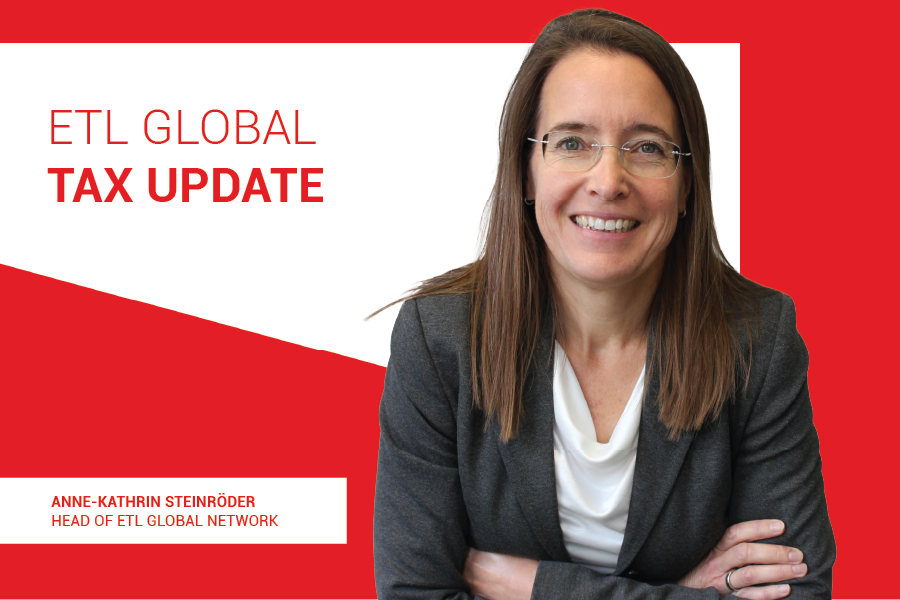ETL GLOBAL Tax Update is a series designed to provide critical insights into recent developments in international taxation. This initiative is presented by the ETL GLOBAL Tax Working Group, a closely interconnected team of international tax experts within the ETL GLOBAL network. The group’s objective is to share their collective expertise on tax matters and ensure that businesses are well-informed about the latest tax regulations and legislative changes worldwide.
This edition of the ETL GLOBAL Tax Update highlights significant tax developments in Germany and France, with insights from key experts Rabia Hedia and Dr Volker Klinkhammer.
France – Rabia Hedia, In Extenso
Changes to the VAT Exemption Scheme in France
France transposed into domestic law the provisions of the VAT Directive (EU/2020/285 of 18 February 2020), which aims to harmonise the rules applicable to small enterprises across the European Union.
The Finance Act for 2024 introduced amendments to the VAT exemption scheme, updating the turnover thresholds and extending the scheme to cross-border activities within the EU.
As of 1 January 2025, the VAT exemption for small enterprises will apply to businesses with a turnover threshold (based on the previous year’s turnover) of €85,000 for the supply of goods and €37,500 for the supply of services.
During the current year, the exemption will remain applicable if turnover does not exceed €93,500 for the supply of goods or €41,250 for the supply of services. If these higher thresholds are exceeded, the exemption will continue to apply for the current year but will cease to apply from the following year.
Specific exemption thresholds also apply to operations carried out by lawyers, authors, and performers.
In addition, the VAT exemption scheme will be applicable in cross-border transactions within the EU. Each Member State sets a national turnover threshold, of no more than €85,000 and the taxable person must have an EU-wide turnover not exceeding €100,000 to benefit from the VAT exemption in another Member State.
The taxable person must notify the authorities in the Member State of establishment in advance of their intention to benefit from the VAT exemption scheme in the other Member State.
Germany – Dr. Volker Klinkhammer, ETL Heuvelmann & van Eyckels
- E-Invoicing becomes mandatory in Germany in 2025:
- The e-invoicing requirement will be introduced as per January 1, 2025 for domestic services between VAT-registered entrepreneurs in Germany. This means: Companies must be able to send and receive invoices electronically.
- Already now many companies are no longer sending their invoices in paper form, but rather via email as a PDF, often directly from order processing and the merchandise management systems. Nevertheless, they may also be affected: Not every invoice that is sent electronically is an e-invoice in the sense of the German regulations.
- For an e-invoice, not only its electronic transmission is mandatory. In addition, a certain structured electronic format must be adhered to for e-invoicing. These requirements are met, for example, with the standard XRechnung. For the electronic billing of domestic sales, the use of other European invoice formats according to the aforementioned standard can also be considered, e.g. B. Factur-X (France) or Peppol-BIS Billing.
- Registration requirement for cash register systems in Germany as of January 1, 2025:
- Already since 2023, electronic cash register systems in Germany must be equipped with a technical safety device (TSE). Together with the introduction of the TSE requirement, the tax administration had actually also planned for a reporting requirement of corresponding cash register systems. However, so far this reporting requirement has been repeatedly suspended. As of January 1, 2025 now, it is supposed to actually start. From then on, the notification procedure will be available, flanked by a transitional regulation for old cases.
- The reporting requirement entails another bureaucratic effort for companies, especially for retailers, service providers, hotels and restaurants, but also all other entrepreneurs who use electronic cash register systems.
- Since the notification of existing cash recording systems must be made by July 31, 2025 at the latest, entrepreneurs should obtain an overview of all systems used in their business premises by the time the notification system is activated on January 1, 2025, and compile the data required by the tax authorities accordingly.





